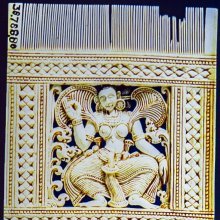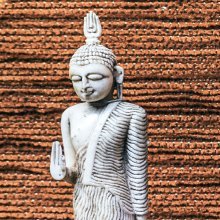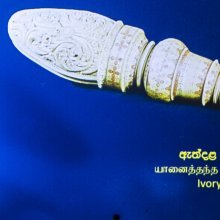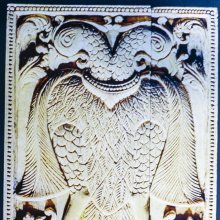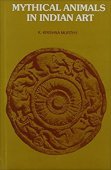Ivory: 3 definitions
Introduction:
Ivory means something in Hinduism, Sanskrit, the history of ancient India. If you want to know the exact meaning, history, etymology or English translation of this term then check out the descriptions on this page. Add your comment or reference to a book if you want to contribute to this summary article.
Images (photo gallery)
(+42 more images available)
In Hinduism
Ayurveda (science of life)
Agriculture (Krishi) and Vrikshayurveda (study of Plant life)
Source: Asian Agri-History: Drumavichitrikaranam—The Ancient Approach to Plant Mutagenesis1) Ivory (powder) was used in the process of transformation (of trees into creepers, and vice-versa): which was one of the technologies known to ancient Indian agriculturists, which presents a safe technology and methodology regarding organic agriculture, according to treatises (such as the Vrikshayurveda). One such technology was to transform trees into creepers and vice-versa: This transformation causes an alteration in the physical structure of the plant. It is noteworthy that transformation of trees and creepers requires the use of unconventional raw materials such as a golden rod, ivory powder and human flesh. In order to transform creepers into trees, adequate nutrition has to be supplied so that their mass increases.
2) Ivory (powder) was also used as an ingredient for the achievement of Polyploidy (“altering the shape of fruits”). The objective here is to obtain the same effects as would be achieved by polyploidy. Once again, the use of uncommon raw materials such as ivory powder, sand, ichor (elephant’s rut), hollow tooth of a monkey or a boar, and a hot needle is prescribed.
Source: Shodhganga: Drumavichitrikarnam—Plant mutagenesis in ancient IndiaIvory dust (in Sanskrit: Danta-Rajas) is used by certain bio-organical recipes for plant mutagenesis, such as turning plants into creepers, according to the Vṛkṣāyurveda by Sūrapāla (1000 CE): an encyclopedic work dealing with the study of trees and the principles of ancient Indian agriculture.—Accordingly, “Musa paradisiaca tree with its root pierced with a golden rod heated in fire of dust of ivory (danta-rajas), turns into a creeper producing fruits for a long time (or fruits of large size)”.

Āyurveda (आयुर्वेद, ayurveda) is a branch of Indian science dealing with medicine, herbalism, taxology, anatomy, surgery, alchemy and related topics. Traditional practice of Āyurveda in ancient India dates back to at least the first millenium BC. Literature is commonly written in Sanskrit using various poetic metres.
India history and geography
Source: Singhi Jain Series: Ratnaprabha-suri’s Kuvalayamala-katha (history)Ivory (of African origin) was commonly traded with foreign merchants in ancient India, according to Uddyotanasūri in his 8th-century Kuvalayamālā (a Prakrit Campū, similar to Kāvya poetry).—The Kuvalayamala (779 A.D.) is full of cultural material which gains in value because of the firm date of its composition. [...] At Sūrpāraka there was a guild of local merchants. It was their custom to hold a reception in honour of merchants from outside and to learn from them the country of their origin, the destination, field of trade, the nature, value and volume of commodity in which he is interested and all such matters relating to his business. [...] One said: “I went to the coast of Barabaricum (a region along the sea-coast of Sindh) taking fabrics with me and brought superior pearls (probably of Persian gulf) and ivory (of African origin)” [...]

The history of India traces the identification of countries, villages, towns and other regions of India, as well as mythology, zoology, royal dynasties, rulers, tribes, local festivities and traditions and regional languages. Ancient India enjoyed religious freedom and encourages the path of Dharma, a concept common to Buddhism, Hinduism, and Jainism.
See also (Relevant definitions)
Starts with: Ivory coast raphia palm, Ivory fig, Ivory powder, Ivory tree.
Ends with: Brown ivory, Pink ivory, Purple ivory, Red ivory, Vahintsivory, Vegetable ivory.
Full-text (+245): Nagadanta, Gajadanta, Hastidanta, Danta, Dantakara, Karidanta, Dantamaya, Dantapancalika, Dantidanta, Dantika, Taradani, Dantavyapara, Dantidantamaya, Asthidantamaya, Gajadantamaya, Rajata, Nagadantamaya, Kunja, Nagadantaka, Kuruviracu.
Relevant text
Search found 101 books and stories containing Ivory; (plurals include: Ivories). You can also click to the full overview containing English textual excerpts. Below are direct links for the most relevant articles:
Matangalila and Hastyayurveda (study) (by Chandrima Das)
Ivory and Trade < [Chapter 2]
Ancient trade in Ivory and Elephant-tusks < [Chapter 5]
Elephants in Epigraphic Records (Introduction) < [Chapter 2]
Complete works of Swami Abhedananda (by Swami Prajnanananda)
Symbology of the Cross or Crux < [Discourse 5 - Path of Realization]
Appendix 2 - Indian Art in all its Phases < [Discourse 1 - India and Her People]
Tibetan tales (derived from Indian sources) (by W. R. S. Ralston)
Elephantology and its Ancient Sanskrit Sources (by Geetha N.)
Settlement in Early Historic Ganga Plain (by Chirantani Das)
Part 6 - Handicrafts of the Vārāṇasī region < [Chapter VI - Vārāṇasī: Emergence of the Urban Centre and Seat of Administration]
Part 4 - Urban features of ancient Vārāṇasī < [Chapter VIII - Vārāṇasī–Sārnāth: Inter-Settlement Relations]
Part 4 - Agriculture in the NBPW phase < [Chapter I - The Case Study of Rājagṛha]
Some Old Indian Art-Crafts < [January-February 1935]
The Ancient Tamil Civilisation < [January-February 1931]
Ancient South Indian Commerce < [October 1939]
Related products
